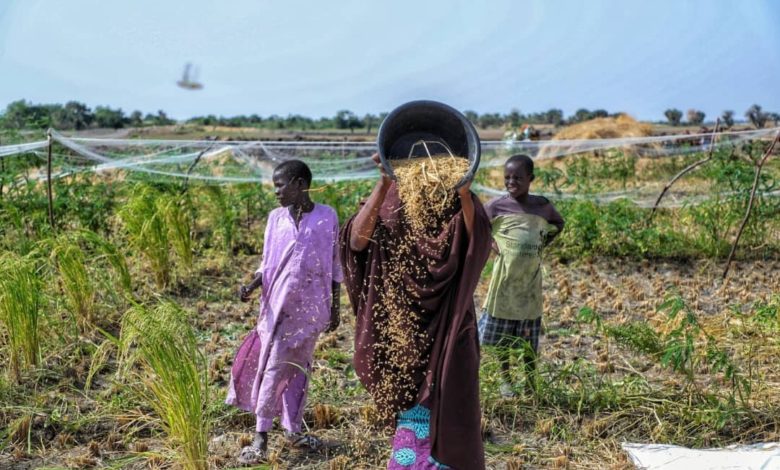Worse Harvest Outcomes Anticipated In Conflict Affected Areas Of Nigeria
The Famine Early Warning System Network (FEWS NET )’s recent crisis signalling report warns about the impact of insecurity and economic conditions on food security in conflict affected areas of Northwestern and Northeastern Nigeria

A recent report by Famine Early Warning System Network (FEWS NET ) warns that insecurity, restrictions, and lower than normal income to purchase agricultural inputs are expected to impact harvest and food security in conflict-affected areas in Nigeria.
FEWS NET was established in 1985 by the United States Agency for International Development (USAID) after devastating famines in East and West Africa, to provide objective, evidence-based analysis to help government decision-makers and relief agencies plan for and respond to humanitarian crises.
According to the crisis signalling platform, attacks in several areas of Northeast Nigeria including Kala Balge, Guzamala, Mobbar, Konduga, Marte, and Damboa Local Government Areas in Borno State as well as Geidam, Yusufari, and Tarmuwa Local Government Areas in Yobe State are driving further displacement.
“Due to conflict and lower than normal income to purchase agricultural inputs, the ongoing main harvest is expected to be limited among displaced and poor households,” the report stated.
The report stated that staple food prices remain significantly above average, constraining food access for market reliant households. It revealed that emergency (IPC Phase 4) outcomes are expected in worst-affected hard-to-reach areas, with crisis (IPC Phase 3) outcomes anticipated across much of the Northeast.
“As the harvest season sets in, in October, food access among some households is expected to improve, where Stressed (IPC Phase 2) outcomes are expected to become more widespread in the region.”
The FEW NETS report says emergency (IPC Phase 4) and Crisis (IPC Phase 3) outcomes are expected to persist in some areas. “A risk of famine (IPC Phase 5) continues, where famine could occur if households are cut off from their typical food and income sources and humanitarian assistance for a prolonged period of time.”
The report also spotlighted the situation in Northwestern Nigeria, including the shutdown of telecommunication services by authorities in Zamfara, Sokoto, Kaduna and Katsina states as part of a military operation and restrictions to hinder the activities of armed groups known locally as bandits. There were also restrictions on weekly markets, main transportation routes, vehicular movement, and firewood sales.
“Daily markets remain open in larger towns. With primary transportation routes closed, there is a restricted flow of fuel and commodities into the region, driving prices even higher.”
“The limitations on movement and firewood sales, along with declines in the availability of markets, have resulted in the reduction in household income, driving household purchasing power down, especially in worst-affected areas.”
According to FEW NETS, the displacement, telecommunications blackout, associated restrictions and military operations have disrupted the ongoing agricultural season. The platform stated that before the telecommunications blackout in the Northwest, conflict and attacks on civilians were at very high levels, leading to high levels of displacement.
“According to IOM [International Organization for Migration], over 833,000 people were displaced in the Northwest and North-central states between late June and late July, with over half of the IDPs located in the Northwest.”
“Displaced households have not been able to engage in the agricultural season as they do not have access to land. In the Northwest, some rural households have migrated to urban areas fleeing ongoing military operations or conflict. Now, these households have to travel back to farmlands to continue harvesting activities, delaying the harvest.”
The crisis signalling platform disclosed that currently, crisis outcomes are likely ongoing in the worst-affected areas of the Northwest. Some worst-affected households are likely to experience emergency or catastrophe outcomes until the harvest is fully established.
“The current movement and market restrictions are expected to continue limiting household income and delaying the harvest. While the harvest is expected to improve household food access as households consume own-produced foods, household production in worst-affected areas is only likely to improve food access for a short period of time.”
Household income in the region is expected to be lower than average across the Northwest as household purchasing power will most likely remain poor.
“From October 2021 to January 2022, Crisis (IPC Phase 3) outcomes are still most likely across worst-affected areas where households had limited ability to engage in the agricultural season. Stressed (IPC Phase 2) outcomes are now anticipated to be more widespread in some Northwestern areas due to continuing constraints on household income.”
FEW NETS also stated that overall, the national harvest is expected to be below average due to conflict, lower than typical access to inputs due to low income, and flooding.
“The poor macroeconomic conditions persist despite the decline in annual inflation for the fifth consecutive month to 17.01 per cent in August from 17.38 per cent in July. The decrease in annual inflation is predominantly due to the decline in food inflation as food prices have declined with the harvest. Although, the annual inflation rate remains well above the expected Central Bank’s (CBN) benchmark set at six to nine percent for 2021.”
“The continued high inflation puts pressure on fuel, transportation, and markets, driving significantly above-average staple prices.”2021
Despite efforts of the government to tackle the situation and improve security, Nigeria continues to grapple with persistent violent attacks that affect food production and economic activities.
Support Our Journalism
There are millions of ordinary people affected by conflict in Africa whose stories are missing in the mainstream media. HumAngle is determined to tell those challenging and under-reported stories, hoping that the people impacted by these conflicts will find the safety and security they deserve.
To ensure that we continue to provide public service coverage, we have a small favour to ask you. We want you to be part of our journalistic endeavour by contributing a token to us.
Your donation will further promote a robust, free, and independent media.
Donate HereStay Closer To The Stories That Matter




